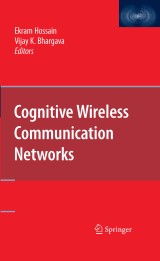Details

Cognitive Wireless Communication Networks
|
149,79 € |
|
| Verlag: | Springer |
| Format: | |
| Veröffentl.: | 23.10.2007 |
| ISBN/EAN: | 9780387688329 |
| Sprache: | englisch |
| Anzahl Seiten: | 440 |
Dieses eBook enthält ein Wasserzeichen.
Beschreibungen
<P>This book provides a unified view on the state-of-the-art of cognitive radio technology. It includes a set of research and survey articles featuring the recent advances in theory and applications of cognitive radio technology for the next generation (e.g., fourth generation) wireless communication networks. The contributed articles cover both the theoretical concepts (e.g., information-theoretic analysis) and system-level implementation issues.</P>
A Brief Journey through “Cognitive Wireless Communication Networks” Ekram Hossain, University of Manitoba, Winnipeg, Canada Vijay Bhargava, University of British Columbia, Vancouver, Canada Introduction Cognitive radio has emerged as a promising technology for maximizing the utili- tion of the limited radio bandwidth while accommodating the increasing amount of services and applications in wireless networks. A cognitive radio (CR) transceiver is able to adapt to the dynamic radio environment and the network parameters to maximize the utilization of the limited radio resources while providing ?exibility in wireless access. The key features of a CR transceiver are awareness of the radio en- ronment (in terms of spectrum usage, power spectral density of transmitted/received signals, wireless protocol signaling) and intelligence. This intelligence is achieved through learning for adaptive tuning of system parameters such as transmit power, carrier frequency, and modulation strategy (at the physical layer), and higher-layer protocol parameters. Development of cognitive radio technology has to deal with technical and pr- tical considerations (which are highly multidisciplinary) as well as regulatory - quirements. There is an increasing interest on this technology among the researchers in both academia and industry and the spectrum policy makers. The key enabling techniques for cognitive radio networks (also referred to as dynamic spectrum - cess networks) are wideband signal processing techniques for digital radio, advanced wireless communications methods, arti?cial intelligence and machine learning te- niques, and cognitive radio-aware adaptive wireless/mobile networking protocols.
Fundamental Issues in Cognitive Radio.- Information Theoretic Analysis of Cognitive Radio Systems.- Coexistence and Dynamic Sharing in Cognitive Radio Networks.- Cooperative Spectrum Sensing.- A Protocol Suite for Cognitive Radios in Dynamic Spectrum Access Networks.- OFDM-Based Cognitive Radios for Dynamic Spectrum Access Networks.- Link Adaptation in OFDM-Based Cognitive Radio Systems.- UWB-Based Cognitive Radio Networks.- Degrees of Cooperation in Dynamic Spectrum Access for Distributed Cognitive Radios.- Cognitive MAC Protocols for Dynamic Spectrum Access.- Game Theoretic Learning and Pricing for Dynamic Spectrum Access in Cognitive Radio.- Decentralized Spectrum Management Through User Coordination.- Optimal Spectrum Sensing Decision for Hardware-Constrained Cognitive Networks.- Microeconomic Models for Dynamic Spectrum Management in Cognitive Radio Networks.- Analysis of Cognitive Radio Dynamics.
<EM>
<P>Cognitive Wireless Communication Networks</EM> provides a unified view on the state-of-the-art in what has emerged as a promising technology for maximizing the utilization of the limited radio bandwidth. With interest in this technology increasing among researchers in both academia and industry and spectrum policy makers, this book offers a wide range of information on the subject. Topics covered include the fundamental challenges and issues in designing cognitive radio systems to the information-theoretic analysis of such systems, spectrum sensing and co-existence issues, adaptive physical layer protocols and link adaptation techniques for cognitive radio, orthogonal frequency division multiple access (OFDM) and ultra wide band (UWB)-based cognitive radio, different techniques for spectrum access by distributed cognitive radio, cognitive medium access control (MAC) protocols, decentralized learning-based dynamic spectrum access methods as well as macroeconomic models for spectrum management in cognitive radio.</P>
<P>Cognitive Wireless Communication Networks</EM> provides a unified view on the state-of-the-art in what has emerged as a promising technology for maximizing the utilization of the limited radio bandwidth. With interest in this technology increasing among researchers in both academia and industry and spectrum policy makers, this book offers a wide range of information on the subject. Topics covered include the fundamental challenges and issues in designing cognitive radio systems to the information-theoretic analysis of such systems, spectrum sensing and co-existence issues, adaptive physical layer protocols and link adaptation techniques for cognitive radio, orthogonal frequency division multiple access (OFDM) and ultra wide band (UWB)-based cognitive radio, different techniques for spectrum access by distributed cognitive radio, cognitive medium access control (MAC) protocols, decentralized learning-based dynamic spectrum access methods as well as macroeconomic models for spectrum management in cognitive radio.</P>
<p>Presents a unified view of the cognitive radio technology (both theory and practice)</p><p>Offers a comprehensive treatment of state-of-the-art cognitive radio technology</p><p>Covers a wide range of topics starting from information-theoretic analysis to protocol design and optimization issues, and test-bed results</p><p>Includes contributions from world-class researchers in this area</p>
<P>Cognitive radio has emerged as a promising technology for maximizing the utilization of the limited radio bandwidth while accommodating the increasing amount of services and applications in the wireless networks. This book presents a unified view of cognitive radio technology (both theory and practice). It includes a set of research and survey articles from world-class researchers featuring the recent advances in theory and applications of cognitive radio technology for the next generation (e.g., fourth generation) wireless communication networks. The contributed articles cover both the theoretical concepts (e.g., information-theoretic analysis) and system-level implementation issues. Therefore, the book provides a unified view on the state-of-the-art of cognitive radio technology and the rich set of references in each of the articles will be invaluable to researchers.</P>


















